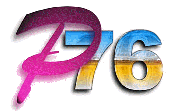One of the manufacturers' boasts was that you could put a
44 gallon drum in the boot and close the lid (and ideal for installing
an LPG tank in later years), so, yes, it was big. Yet, despite all the
minus points (and the bagging it got from those who had never driven
one), Leyland's huge P76 turned out to be a very successful rally car.
The butt of many jokes, the P76 was a gutsy attempt by Leyland in
Australia to slip into the domestic family car market in 1973. Unkindly
nicknamed the P38 (less-informed critics suggesting it was only half a
car), it was very advanced for its time and in a number of areas left
the opposition in its wake. The car received extremely positive reviews
in all the local publications, was the subject of numerous comparison
with the Big Three family cars, and was an instant hit with those who
had bothered to take the time to have a test drive in one. There were 2
basic versions of the P76 - a 6-cylinder version and a V8 which had the
famous Buick-derived aluminium alloy V8 that powered other British
Leyland vehicles such as the Range Rover and the Rover 3500. The 4416cc
V8 turned the basic car into a real weapon and, combined with brilliant
handling, good ground clearance and 175kmh top speed, the P76 was just
waiting to be rallied.
Several attempts have been made to rally the car in Australia, the
first being an entry by Richard Hill and John Bryson who ran a P76 in
the Regie Renault Rally in September 1973. Hill also ran the car in a
Clubman rally at Batemans Bay a fortnight later with Sonja Kable-Cumming
(later to become Bryson's wife) as navigator and followed this up with a
run in the Rally of the Hills later that year.
Hill and Kable-Cumming entered the car in the very wet 1973 Southern
Cross Rally and were the only finishers in the large-car class. But by
far the most-publicised P76 rally car was the Evan Green/John Bryson P76
Executive V8 that was entered in the 1974 UDT World Cup Rally. The rally
started in Wembley, a suburb of London and finished at Munich in
Germany, celebrating the 1974 soccer World Cup. Inspiring the famous
Evan Green book "A Bootful of Right Arms", the rally took
crews through France, Spain and North Africa, into Algeria, Tunisia then
back through Greece and Turkey. Despite dropping back in the field after
a strut broke on the road to Tamanrasset, Green and Bryson repaired the
car and set the fastest time on the 72km. old Targa Florio special stage
in Sicily, thus providing an ideal advertising opportunity for Leyland
in Australia. In recognition of the car's performance, the Targa Florio
V8 was released and has since become a much-coveted version of the
model.
In the 1974 Southern Cross Rally, two cars were entered for Evan
Green and Hal Moloney but by then the P76 death knell had sounded and as
the two cars left on the first stage, news came through that production
would cease.
In other events, Tom Barr-Smith ran a P76 in rounds of the Australian
Rally Championship, achieving a 6th outright in the Warana
Rally in Queensland and a remarkable 4th outright in the
Alpine Rally in Victoria. Barr-Smith and Rob Hunt brought their V8 P76
home for a win in the first round of the 1975 South Australian Rally
Championship. The same car was equally successful in the fifth round of
the SARC when Lou Rayner and Jeremy Browne took the Leyland to a further
victory.
Around Australia there were a number of other less-well publicised
outings for the P76 in club rallies and sprints, but by far the largest
gathering of P76s was in the 1979 Repco Round Australia Trial when no
less than five Leylands were entered.
According to Hal Moloney's excellent new book "Leyland
P76", the car continued to be rallied during the 70s and 80s and
even into the 90s. Drivers such as Ted Dobrzynski, Bruce Garland, Hal
Moloney, Bruce Ruggles and others regularly competed with varying
success and by then the car's reputation had been well and truly
cemented in history.
Today, a good P76 could still be a potent weapon in club rallying or,
for that matter, the Aussie Car class in the ARC. Great handling,
strength and durability as well as a powerful V8 motor that lends itself
to tuning for more power, are all "plus" points in the P76's
armoury. And the Targa Florio is a highly desireable collector's item
for classic rallying or just for storing away as an appreciating asset.
Had Leyland Australia not had so many problems during the car's short
2-year history, it may well have gone on to have been a solid
alternative to the Big Three cars on the Australian market. Sadly, like
so many other cars sold here, it didn't stay around for long. Had the
Federal Government tipped in a few million dollars to ease its financial
woes (as it has with Mitsubishi recently), it could have been a much
greater success.
